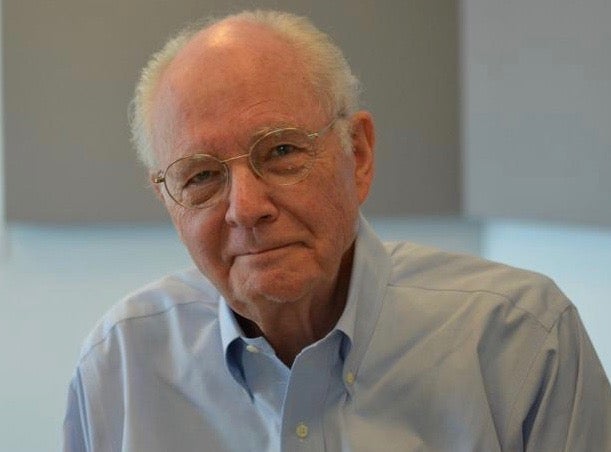Public radio visionary earns prestigious Polk journalism award
An early shaper of public radio’s sound and mission, Bill Siemering created shows that remain popular decades after their launch. Now he helps spread radio across the globe.
Listen 1:20
William H. Siemering taken in 2017 during a visit to KWMU in St. Louis. (Kelly Moffitt/St. Louis Public Radio, KWMU)
One of public radio’s founding visionaries has earned a top journalism prize.
Bill Siemering, 84, will get the George Polk Career Award, an honor previously bestowed on the likes of cartoonist Garry Trudeau, writer Gay Talese, and television reporter Morley Safer. He will pick up the prize in April.
“It really means so much to me because these are such distinguished journalists who won these awards,” Siemering said. “To be recognized among them is just overwhelming.”
Siemering’s influence is still apparent on the airwaves. He wrote National Public Radio’s original mission statement and helped create its flagship news program, “All Things Considered.”
He later landed at WHYY, where he turned “Fresh Air” into a national program and spearheaded the creation of “Radio Times.”
Born outside Madison, Wisconsin, Siemering wove his life through the many phases of radio’s development.
He grew up listening to WHA, one of the first stations to experiment with radio airwaves. The teachers at Siemering’s two-room schoolhouse would play WHA’s “Wisconsin School of the Air,” which broadcast lessons on art, science, and nature.
“I realized then that radio was a wonderful source of information and imagination,” he said.
Siemering later worked at WHA and WBFO in Buffalo.
His work in upstate New York led him to National Public Radio, where he helped shape its voice. The 1969 mission statement he wrote for NPR called for a service that “will not regard its audience as a market, or in terms of its disposable income, but as curious, complex individuals who are looking for some understanding, meaning, and joy in the human experience.”
Siemering sought to distinguish NPR from the educational programming of his youth and the buttoned-down sound of commercial radio. Among his most lasting contributions was “All Things Considered,” which has grown into one of the nation’s most popular radio programs.
“He never liked this, but I called him our philosopher king,” said Susan Stamberg, an early co-host of “All Things Considered.”
Stamberg became the first woman to anchor a nightly national news program, despite the objections of station managers who told Siemering that women didn’t have the gravitas to host news shows. But where those station managers saw a reckless rejection of orthodoxy, Siemering saw an opportunity.
“I wanted to get away from that single voice of authority of a white male from New York reading the news,” Siemering said.
Stamberg believes the conversational, public radio sound pioneered in the 1970s remains at its core today.
“To this very day really we don’t have that sort of deep-voiced totally authoritative sound at all,” she said. “We have people who are human beings trying to piece together what’s going on in the world.”
After a stop in Minnesota, Siemering arrived at WHYY in 1978.
He inherited a station that reached about 60,000 listeners a week, Siemering recalled, less than the ratings posted by an affiliate in Ames, Iowa.
Audience grew steadily during Siemering’s nine years at the station. He pushed for “Fresh Air with Terry Gross” to become a national program, and it has since become one of the most popular radio shows in America.
When the ascendance of “Fresh Air” created room for a new local show, he helped create “Radio Times with Marty Moss Coane.” “Radio Times” has now been on the air for more than three decades.
“I think the most important thing was hiring wonderful people,” Siemering said. “It’s been a privilege to work with all the folks that I’ve hired.”
Siemering left WHYY in June of 1987 after clashes with management, according to a retrospective he penned for Transom in 2003.
He became executive producer for a documentary program called “Soundprint,” and later founded Developing Radio Partners, a nonprofit that aids community radio stations in Africa.
Since 2017, he’s been a senior fellow with the Wyncote Foundation.
Skeptics have predicted radio’s demise ever since Siemering got his first job at WHA in 1952. The medium endures, Siemering says, because it offers an intimacy television and digital media cannot.
“Because there aren’t pictures, people use their imagination about who’s talking and where they are,” Siemering said. “So they own pictures. The listener owns the pictures.”
WHYY is your source for fact-based, in-depth journalism and information. As a nonprofit organization, we rely on financial support from readers like you. Please give today.





